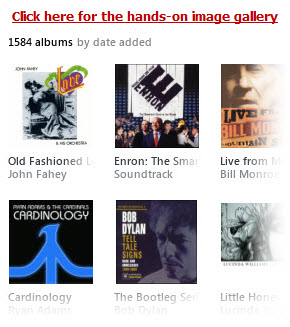Why the new Zune Pass should be irresistible

The music industry has been stumbling and bumbling with subscription-based music services for years, and I’ve been experimenting with them since the very beginning.

I’ve been using the Zune Pass service for the past five months and absolutely love it. The Zune software is superb, and the end-to-experience is better than anything Apple has to offer. In my opinion, the new terms should be irresistible to any serious music fan. I’ve put together an image gallery that gives a better idea of how the service works, so you can see for yourself.
Four years ago, I tried the granddaddy of subscription services, Napster To Go. At the time, the math made perfect sense for me. As I noted, I have a very large music collection that consists of more than 20,000 tracks from nearly 2000 albums and live recordings:
I’d say there are probably 400 CDs in my collection that I haven’t listened to in years and probably never will again. Some are just dated, but others were impulse buys based on an artist or a label. Sometimes those purchases work out well, but I can easily pick out a couple dozen CDs from my collection that I bought, listened to once, and quickly concluded that I had made a bad purchase. In some cases I was able to listen to individual tracks, either in a record store listening booth or in those 30–second clips on Amazon.com. But that was just enough to fool me into thinking I wanted to hear more when I really didn’t like the CD.
If I had had access to a download service where I could have sampled the entire recording first, I might well have avoided a few of those purchases.
But I canceled my Napster To Go subscription after a few months, because it didn’t work. Tracks I had downloaded to a portable player wouldn’t play, even though they were properly licensed. At one point the software stopped acknowledging my right to download music at all, and it took an hour on the phone with Napster support to get things sorted out. I had similar experiences with Yahoo’s subscription service last year before they sold out to Rhapsody.
By contrast, in five months of regular use of the Zune Pass service, I cannot remember a single glitch. Tracks I downloaded to a portable Zune player work every time, and I’ve added roughly 150 albums to my collection in five months without having to pay anything extra for the privilege. In addition to the 150 albums in that subscription collection, I’ve listened to dozens that I decided weren’t worth keeping, and I’ve purchased roughly 15 albums that proved they were worth paying for.
The biggest weakness with the Zune Pass service is that it doesn’t work with iPods and never will. It doesn’t require a Zune device as long as you’re willing to listen exclusively via PC (or through Media Center extenders, which can play Zune subscription tracks through a home audio system using your wired or wireless network). But in a world where iPods have an effective monopoly on the category, it’s hard to convince people to try something new.
To me, the surest sign of success for the new Zune service will be if Steve Job decides, after years of dismissing the idea, to add subscription support to the iTunes store. Rumors of an iTunes Unlimited service appear every few months, but so far at least, they’ve failed to materialize. Can Microsoft make enough of an impact this time to change that approach?